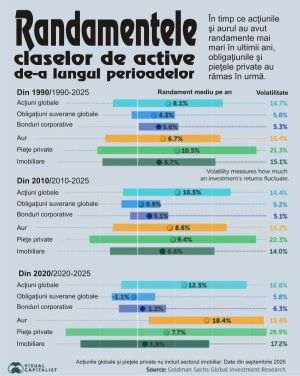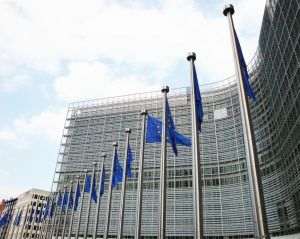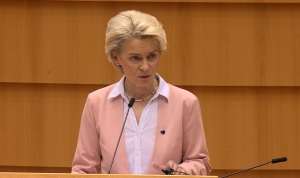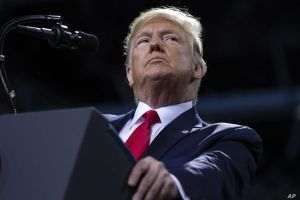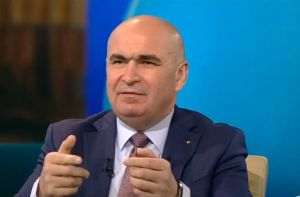The Ministry of Public Finances plans to issue government bonds for the population annually or even twice a year, but the amount will be announced for each individual case depending on needs and market conditions, Minister of Public Finance Anca Dragu said on Friday, at the launch of the government bonds issue on the BSE.
Mişu Negriţoiu, the president of the Financial Oversight Authority (ASF), said: "I am happy that this bonds issue won't remain a one-off and it can turn into a program, but that needs to happen by default. The activity of the Bucharest Stock Exchange (BSE) should be a sustainable one, because we can't just survive from one event to the next and unfortunately, one flower does not a garland make, so to speak. This is an opportunity for reflection, we need to think about what makes an activity sustainable in the end".
Mişu Negriţoiu claims that the objective on the stock market is the move to the emerging market status: "I am hereby inviting shareholders, the Board of the BSE, the executive direction, to devise a program for the reformation of the exchange, institutionally speaking. There are some things that need to be reviewed: its own direction, the objectives, the governance model, the cost platform. We have reduced to zero the costs of the government bonds issue, but there are many other preferential costs, depending on the platform access. There are far too many privileges for the members of the Exchange compared to the others".
The ASF official further said: "There are marketing programs that need to be activated, roadshows are needed for the issues of bonds, state bonds, municipal bonds, like we did last year, a roadshow for stock issues.
The Exchange needs to get more involved, and this is the time to reconsider the overall activity, because it won't be possible to have the prime-minister show up on every bond issue".
Mr. Negriţoiu mentioned that for three years now, the authorities have been working on various actions to reform the capital market: "The previous government and the current government have supported the reform of the capital market, including that of the Financial Oversight Authority, and we are at the end of a cycle. We have started off with the famous law of the eight barriers, we have followed through with the simplification of the capital market transactions, we have cut costs as much as we could. The ASF is essentially taking everything that represents transaction contributions down to zero. We have recently cut the market makers' contributions to zero, we have regulated everything that can be regulated on the stock exchange, including short-selling".
He said that stock market executives just can't keep waiting for an IPO like Hidroelectrica or some other, for the capital market activity to turn around.
Mişu Negriţoiu claims that the BSE needs to think about more sustainable things, thus developing the volume of transactions on the stock market.
• Anghel (BSE): "The fees charged by the ASF represent one third of the Bucharest Stock Exchange earnings"
The reformation of the Bucharest Stock Exchange is a long-term process, which is in fully underway, but the institution is still facing administrative barriers such as the fees that the Financial Oversight Authority (ASF) still charges or the introduction of the social security contributions to be paid on trading earnings starting in 2017, the president of the BSE, Lucian Anghel says.
He said: "The reformation of the Bucharest Stock Exchange (BSE) is a process that takes place over a very long time. I think that everyone should tend to their own garden, to see what else they can improve. In that regard it is clear that every party has a lot of things to do. Our priorities are very clear, they have the approval of the shareholders, and among them, there is this project to attempt to develop the capital market, by achieving the move up to the emerging market status. We also have priorities when it comes to financial education and the increase in the number of Romanians, investors that are interested. Essentially, this government bond issue (Fidelis Centenar - ed. note) brings tens of thousands of Romanian one step closer to the stock market".
On the other hand, the president of the BSE claims that the fees levied by the Financial Oversight Authority (ASF) represent one third of the earnings of the Stock Exchange. "If we look at the total expenses, we are still forced to acknowledge that out of the 20 basis points charged on selling and buying, the ASF actually takes six, meaning one third, and the Bucharest Stock Exchange gets two thirds", said Anghel, quoted by Agerpres.
According to him, these adjustments will be finalized in time, as the market develops and the problems in the past are resolved. "There are a lot of things that come from the past, that have yet to be resolved after a long time, some of the legislative elements have been fixed, but there are a number of such elements left. For instance, we are now trying to clarify how the social security contributions on stock market investments will be paid starting next year. This measure will be a new barrier for investors", the president of the BSE further said.
In this context, he stressed the fact that the state must contribute to the development of the capital market because that is the only way to have more investors which it can tax: "It is very important to have earnings to tax (the difference between the buying and selling price). So, if they [investors] are stimulated to buy and to sell, to also turn out of a profit, then the state wins as well. If they aren't or if the amount decreases, then the state collects less".
The president of the BSE also says that mechanisms have to be created to bring as many investors as possible to invest, for the state to tax them as well.




